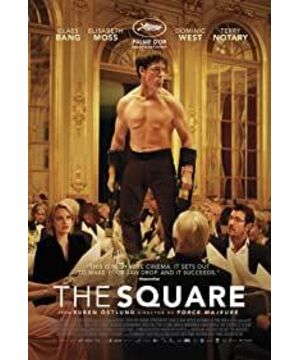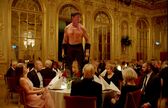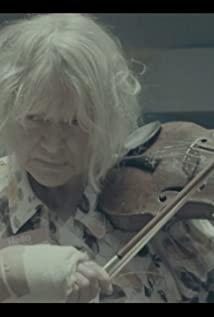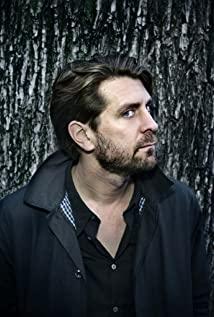The article is divided into two parts. The first part first talks about the significance of the film's appearance and award in the context of European reality, how to face and reflect the issue of "political correctness" in European society, combining several cases in the film; the second part is about the film The narrative and a few motifs of its own, specifically discuss the film's "absurdity and reality under indifference", and then analyze it.
Cannes Prize in Europe: presenting two sides of political correctness
On a larger scale, Europe (or Europe and the United States), which has a profound Christian tradition, also has a tradition of atonement; the religious spirit imperceptibly determines a secular habit, that is, to contemplate and reflect on history or current sins or shortcomings. Therefore, in order to eliminate the various colonial and aggression activities dominated by Europe in modern history, Europe after World War II has undergone reflection and atonement and has become the most tolerant, diverse, and accepting civilization and political subject. This is manifested in the prevalence of post-colonialism, which not only strongly affects the cultural world, but also affects the choices of civil society, making Europe change from an aggressor and a colonist to a cautious and resolute defender of political correctness that is worried about offending others; It also shows that in the turmoil of today’s world (especially the Middle East), Europeans are very used to take responsibility and attribute the current war and refugee displacement to the evil consequences of their own creation of capitalism or the legacy of their previous colonial history. As a result, during the atonement process, Germany, which was once extremely exclusive under the Nazi rule, is on the front line of atonement and introspection, opening its doors, embracing refugees, and the people of the world as a family.
In fact, from the perspective of psychological structure, introspection and atonement have also brought Europeans a strong sense of superiority—just as when fighting for military strength, I can invade and defeat you, and suppress you by force; nowadays, in peacetime, I compete for morality. Feeling, I can take the initiative to atone for my sins, tolerate you, but also because I have a higher level of thinking. Although the external form of competition has changed (from military competition to moral competition), the Europeans' psychological superiority remains unchanged.
But having said that, Europe has every reason to be superior. Despite the fact that military is hard power, a nation that knows how to introspect in morals is definitely better than a nation that thinks it has great values. Europe is immersed in such a sense of superiority because it is worth it. But you must know that there is no problem with the superiority of the heart, and the atonement and introspection are also worthy of praise, but sometimes introspection is overdone and overcorrected. From one extreme to the other, it will bring new problems instead of just correcting the past. mistake. In Europe today, reverse discrimination (that is, people in the mainstream deserve to be violated, and people on the periphery are reasonable in everything) caused by the flood of political correctness has become a common problem. It is in this historical shock that a large number of Europeans have become politically correct fundamentalists, morally superior, excessively tolerant, refusing to criticize others, for fear of turning back into “colonialists” who invade others; not only that, these Politically correct fundamentalists, on the other hand, are harsh and strict on their own people, strictly guarding against them, not allowing them to make a critical voice, pointing out that criticizing the weak is fascism, and they must become defenders and protect the superficial harmony-therefore The so-called "weak" have become powerful and unscrupulous "violators", because they will not be restricted by public opinion anyway.
I think that the award of "Square" in Cannes is still a consistent manifestation of European superiority, because on the one hand, the film is a work of reflection and criticism of the current sins-you know, this kind of self-criticism and critical reality work, In a certain country, it must be regarded as a reactionary art that refers to sang-hui, and it must be strangled to death by infancy—and Europeans (mainly middle and upper class, the representative is the male protagonist of the film, that is, the art gallery senior curator Christian (Of course, it also includes the judges and movie-watching groups in Cannes) willing to watch oneself be ridiculed and exposed, not only not hiding, but also awarding an award. This is a manifestation of self-confidence and superior publicity. On the other hand, what is more important is that this film that sheds light on and reflects on today is by no means a stupid "political correctness" spokesperson. It only presents a certain aspect of values, from one extreme of history to the other extreme. On the contrary, the film is particularly commendable with multiple voices , where there is a ruthless refutation of indifference to human feelings, care for the weak-but more importantly, it also portrays the human evil of the weak either metaphorically or truly. , And the absurd reality in the context of the flood of political correctness . Although the director seems to be trying to satirize the representatives of the upper-middle class, that is, the senior curators of the art museum, on most issues, the director does not present a clear critical or satirical position, but chooses representative reality to shoot the film. Material, so that the audience can choose their own position. Therefore, perhaps I find it absurd and ridiculous, but other audiences may find it very normal.
Let me cite a few examples to reflect the author's reflection on the two sides of "political correctness", or more accurately, to present Europe (Sweden) realistically and without judgment:
1. The senior curator Christian went to pick up the package on 7.11 and met a tramp sitting in the corner. The latter asked him for money. He smiled and said that he did not have it, but he could buy her food; she was impatient, but also Ordered food, arrogantly, instructed Christian to buy a chicken sandwich; Christian turned around to buy it, she continued to yell, saying that there should be no onions in the sandwich, which was quite natural. Christian had something to do, but he bought it for her, and finally threw it to her, leaving a sentence: "Your bread, pick the onion yourself." Here, the director does not present any position; the position is naturally determined by the audience: some people may think that Christian is hypocritical and a good person; some people think that it is very happy. Here, we cannot help but reflect: Does political correctness mean that the weak are justified? What limit should be reached to help the weak?
2. In a speech at an art gallery, a patient with Tourette syndrome joined in. During the speech, he repeatedly yelled at swear words, offended public order many times, and turned from a weak person to a violent person. The participants were all middle-upper-class audiences with artistic tastes. They were highly civilized, but in the end they were almost intolerable. At this moment, a more educated uncle jumped out and asked everyone to tolerate the swearing idiot, saying that he was "mentally tortured and sad" and let others endure—so others continued to endure. The film director makes good use of satire. I wonder if he is ridiculing this elder brother who exhorts others? The answer is also two points: some viewers may agree with this big brother, some viewers do not. However, the people present were all sensible people, and regarded this man full of foul language as a complete idiot, just as the American journalist later imitated and mocked the foul language of the foul language fool in front of a senior curator; but During the speech, everyone did not say anything on the surface and did not solve it. I am sorry to kick this disruptor out of the house. It seems that there is a very high threshold for political correctness, and it cannot be crossed anyway.
3. At the press conference at the end of the movie, because the promotional video violated ethical taboos, it aroused public outrage in the society. The reporter's question was very funny and ironic. On the one hand, some people yelled at senior curators and used beggars to advertise, while the people at the bottom had nowhere to speak up; on the other, some people yelled at senior curators for being guilty of words and resigning for making free speech nowhere. This duality is a long-standing problem faced by a free society and the reality of a long-term struggle between political correctness and freedom of speech. ——Finally, when talking about the exhibition, the people from the marketing department of the art gallery unexpectedly jumped out and told reporters that the media manuscripts and pictures of the exhibition were all included. By the way, all the advertisements for the exhibition were made... The newspapers also reported it.
4. In the performance art scene, an orangutan played by one person makes a high-end cocktail party, which is of great significance. First of all, the scene is very jumpy, and it feels like it has nothing to do with the narrative. Although this orangutan is the protagonist of a video work that appears repeatedly in the movie, all these preparations seem to be for this scene, including "orangutans" or other places. The presence or metaphor of "best nature" is like a foreshadowing; and the scene itself does not fit the protagonist's life context. I have to speculate that the director wanted to make such a scene from the beginning, and then adjusted the plot to incorporate this segment into the play. Based on such speculation, it is difficult for me to refrain from viewing this scene as a full and complete metaphor, which is connected with the current situation. To put it bluntly, this orangutan who broke into the high-end cocktail party is a Muslim refugee who broke into European society . The setting of performance art is "jungle", which is like the "state of nature" discussed by Hobbes, that is, the natural state of human beings is the constant war between each other for survival, cruel and bloody without the constraints of external forces. In this "jungle" of performance art, a wild beast breaks in, "If human beings are weak, it will stimulate its hunting instinct", which further confirms the natural struggle for the survival of the fittest. If humans run away, they will be hunted by wild beasts. Therefore, the only way out is to hold your breath and not speak. And the result? People who hold their breath may not be noticed, and can hide in the crowd, knowing peacefully: The dead person may not be me, but someone else. Sure enough, after the beast broke in, everyone did not move, did not speak, and accepted the teasing of the beast. Some people were irritated and tried to stop the project. It was useless and had to leave; in the end, the beast jumped to the table. Openly molested a female guest. She called for help, but no one paid any attention. Later, she was dragged to the ground by her hair and almost raped. Finally, there was an elderly man who couldn't stand it and dared to compete with evil spirits and refused to give in to the overlord. After an inch, they rushed up single-handedly, and then, the men who had not spoken all came along and beat the orangutan angrily. The molested woman flees hastily.
It is not difficult for us to connect this scene to the recent situation in Europe, that is, the various sexual harassment and rape incidents brought about by refugees after they came to Europe. Reflecting on the setting of this performance work, people can't help but ask: Why do humans have only three choices in the face of beasts? That is, weakness, escape, or breathlessness? Why can't you hunt the wild beasts in the first place? Because we know that this is not in line with humanitarian political correctness. However, humanitarian political correctness absolutely cannot be without borders, allowing the weak to satisfy their nature and do whatever they want, otherwise, the consequences will be as shown in the figure above. The people at the banquet are basically patrons of the museum and the naked upper class. Therefore, they are more civilized and more patient than the audience of the lectures mentioned earlier. They thought that as long as they were civilized and patient, everything would be okay. How could they think that the lunatic in the last lecture was only verbal, and the beasts at this banquet brought all kinds of physical injuries. This indecency was finally stopped, and the solution was nothing new-civilized people finally stepped down from the temple, still resorting to violence and returning to the Hobbesian "state of nature."
Europeans have no answer. They know that the starting point for political correctness is a good one. However, this road has gone too far, and it has even reached the point where they cannot accept criticisms of political correctness. However, "Square" at least presents the tragic and contradictory reality of "politically correct" good intentions sometimes bring evil results.
Although this film criticizes political correctness, it at least (through direct expression and indirect metaphor) presents the absurdity of political correct fundamentalism. It is not easy to be able to present such a reality.
This kind of presentation reminds people of an art project of German artist Christoph Schlingensief in 2000, which appeared in the form of a TV broadcast called "Foreigners out!". He invited a number of immigrants from Austria (it is said to be real immigrants, but no one actually knows the true or false) to come to the middle of a city, live in a box, live their lives on TV, and then have Austrian residents at intervals. Time to vote, choose a person, not only deported to the box, but also deported. In this process, the people have participated extensively, and various voices against refugees have appeared. Christoph Schlingensief only carried on the project, did not support the voice of any party, but presented the voice of the people. As a result, we saw the dispute between the left and the right, and at the end, how the left wing demolished the wall and punched holes, overthrew the show in the form of violence, and "rescued" these refugees-but only Schlingensief knows that these refugees are real. Fake. I have such a short comment:
Schlingersief's film project about refugee was made to objectively re-enact and reveal the reality, and let the citizens drawn into the project behave and make the choices totally on their own. The result is a “happy” ending—with the pro-refugee citizens won the campaign, but as audience, we see how these peace-advocates won the campaign in a violent way, as if self-claimedly holding the morally correct proposition, they could then do whatever it takes to win, to fight violently for humanity.
Reality under absurdity and indifference-what kind of society and what kind of art?
If the director's objective presentation of the two sides of political correctness is regarded as his indifference to society, I am afraid it is wrong. Pointing the camera at babies and homeless people many times is a testament to his left-wing care-although, I am afraid that he himself is also entangled in how much left-wingers are doing to promote equality, and how many left-wingers are just using equal words to profit. Therefore, he criticized the irony while empathizing. These ambivalences are gathered in one person-the protagonist, the senior curator of the X-Royal Museum, Christian. There are social absurdities in him, the indifference of groups and individuals, and the traces of living and real people.
If the director portrays Sweden without exaggeration, then the Nordic paradise is also full of misfortune: no one cares about people calling for help more than once; no one cares about beggars begging; no one cares about cooks who introduce dishes. In this highly capitalist society, although it appears to outsiders that it has an excellent welfare system and an active civil society, it is unexpected that social atomization is still so serious, and everyone is in a separate battle, and it has nothing to do with them. The music and voice-over of the movie are very controlled and go back and forth. The main performance is a combination of classical music and human voices. It is supplemented by the repeated social sounds of "helping lives", babies crying, and dog barking, which are also the questions and strange phenomena that the protagonist uses to constantly torture himself.
The protagonist had his cell phone and wallet stolen while helping others, but he happened to be a "hero" without being involved in the rescue scene, and became a tragic hero and was framed by others. In this era, even the poor are not easy, because quietly begging or whispering for help is unattended. Only by pretending to be crazy and screaming for help and creating turmoil can we attract the attention of others. At the beginning of the movie, when the bursting beastness and the indifferent humanity were replaced with each other, it quickly sank into the peace of the past, as if nothing had happened. The whole picture is absurd.
So, back to the question of art. What does art do in such a society? What can I do?
The movie’s art work of the same name is "Cube": The cube is a sanctuary of trust and care, within which we share rights and share responsibilities.
Yeah? The art world is precisely the most embarrassing place, the sanctuary of trust and care, and the home of suspicion and hypocrisy. The beggars prayed for 1 crown, but no one paid any attention. The X-Royal Museum received a sponsorship of 50 million crowns as soon as the camera turned around. The art circle is discussing the issues of art and non-art, space and non-space, trying to level life and art, and pursuing social equality, but they are talking to themselves, no one cares, and they don’t know where they are. American female reporters are getting nervous. The most obvious irony is the section where Christian apologized to the child in the video: he was apologizing at first, reflecting on his own mistakes; then he thought that his mistake was because of the fear of the poor neighborhood where the children lived; and then he talked about the social class. Distinguish and divide, and began to drop the book bag to investigate the reasons, thinking that this is the profound cause of the social structure, as if to justify oneself.
The art world is really sad, but is Christian really that hateful? Although the language of the film seems to be directed towards his satire, is he not a real man in this world (including the art world)? What he represents is the reality under the absurdity and indifference.
He has a strong desire for selfishness and self-protection. Two major moral doubts are: after a one-night stand, he was afraid that a female reporter would accuse him of rape. Unscrupulous (under the advice of others), if you provoke a child, do not apologize immediately. As far as the relationship between men and women is concerned, he recognizes the benefits that power brings to him and enjoys it-although it is hard to say how much he bullied the female reporter, because I don’t know if they love me; he apologizes to the child. In other words, he delayed admitting his mistake for a long time, but he has been condemned by his conscience, and finally returned to his conscience—disregarding his image and going through the garbage dump, and came to apologize, even though it was too late.
However, perhaps as he said, his selfishness and self-preservation also have deep reasons for the social structure. This is both his rhetoric and the truth. On the surface, he advocated equality and caring for the goodness represented by these "squares", but what he did was unsatisfactory. However, he was finally tested by his conscience, and he eventually promoted goodness in his exhibitions. To be worse, he is a hypocrite who knows and does not unite; better to say, he is still working hard to do something in the field of art on the basis of maintaining the most basic needs of reality (selfishness and self-preservation) in order to promote " The concept of "Square".
Looking back, he is a good leader and a good father. It seems that he is not as evil as the irony of the movie, but he has not become a perfect person in morals and actions.
This is his personal dilemma as a curator, and also the moral dilemma of conscientious contemporary art in society.
If this movie is understood as a ruthless mockery of Christian, then we are occupying a high moral position and look down on others-unless we can also be confident that we can become morally and operationally perfect.
We need to empathize, understand with compassion, and more importantly, be sober and not arrogant. Art, whether it is contemporary art or film art, is already so powerless. So at least, you have to face your position clearly and face the truth.
View more about The Square reviews









